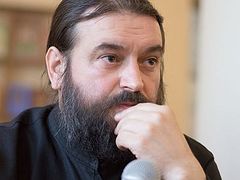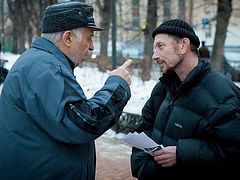In May I got a call from the Barnaul (a city in southern Siberia) hinterlands. It was a from thirty-year-old man I’d never met before, expressing his desire to come to Tuva1 for a missionary convention. I was confused when Roman informed me that he was blind. To be honest I didn’t know how to answer him, but I couldn’t turn him down because the call came during the week of the Blind Man [the sixth week after Pascha]… Two months later Roman arrived in Kyzyl, having just buried his mother three days before. Before she died she told him that he must definitely go to Tuva, because he’ll be useful there. And truly, Roman brought much benefit; at least he did to me.
Roman was accompanied by his seeing-eye dog Margo and some brothers from the Barnaul metropolia. It was not an easy trip, especially since Roman has a weight problem. As a teenager Roman could walk and see. But his whole life changed drastically after he drank some caustic alkali by mistake. As a result his eyeballs were burned and a string of illnesses ensued. But despite all this Roman did not get depressed; he learned to be a programmer, which is now his occupation.
Like all the others who came to the fifth missionary convention in Tuva, Roman participated in street mission. It fell to me to go with Roman, and therefore it was easy to start a conversation with passers-by, basically like this: “Hello! Just imagine, a blind man has come all the way from Barnaul to tell you about God!” No one dared to turn away or refuse to pay some attention.
And when we came up to a bench on which two elderly Tyvan ladies were sitting, upon learning that a blind man was standing before them they moved over a little and asked him to have a seat. Roman began preaching to them. Then one of the grannies proclaimed with amazement, “This is no accident! He didn’t come to us in vain—we’re both blind in our right eyes!” And both of the women really were squinting in their right eyes, although I didn’t notice it right away. For them a preacher who was blind in both eyes was a consolation of sorts. We remained on the bench and didn’t have to go up to anyone, because the seeing-eye dog caught the attention of passers-by who stopped to have a look at something they’d never seen before. We only had to invite them to come closer, to tell them about the most important thing and give them a gift of missionary literature.
At the end of our preaching we met a woman who practices fortune telling and justifies it by saying that she prays to Christ, and “He helps her.” As we were talking, three gypsies walked up and listened, but they didn’t agree with Roman; they considered that fortune telling pleases the Lord. When all our arguments had ended, Roman turned to his seeing-eye dog and asked her, “Margo, tell us, is fortune telling a sin?” Margo replied by barking so loudly that one of the gypsies leapt to the side in fear. “See? Even the dog is preaching to you…”
The second part of the convention took place in a missionary expedition on the banks of the Enisei River in a Tuva village. Living in a tent camp, each of us tried to help Roman in any way we could, carrying our brother’s burden. And he in turn gave us the gift of a good mood with his humor and showed us that even in such difficult circumstances as these, a Christian should not give up, not despair or get depressed. It is miraculous when a blind man helps the sighted, when a man in straightened circumstances brings benefit to those who live in comfort.








